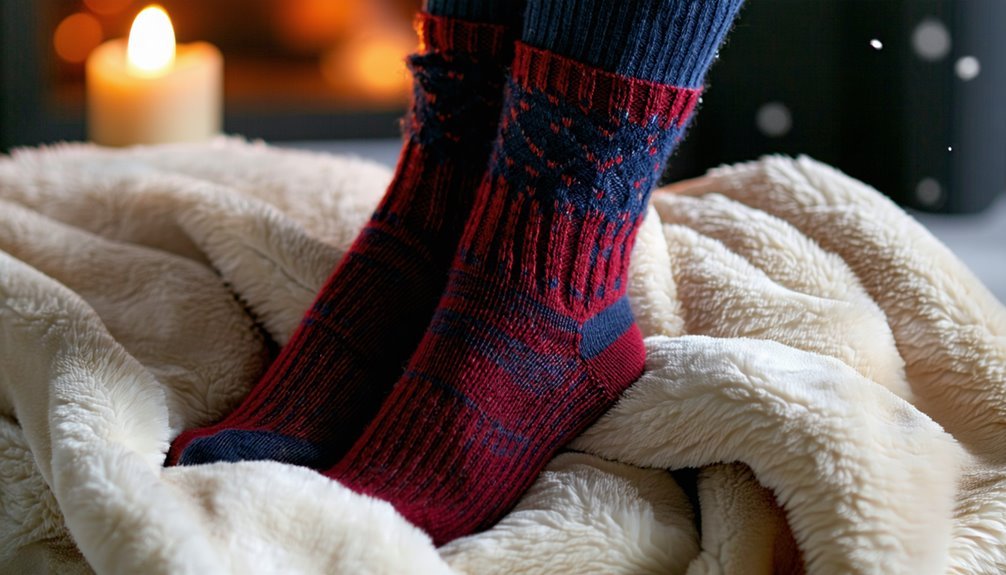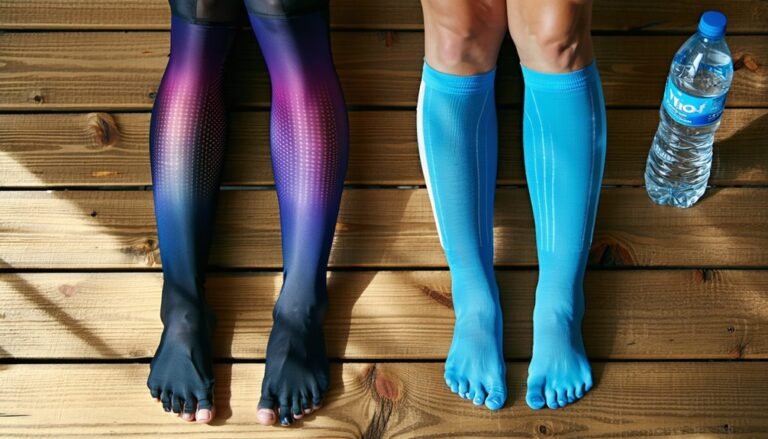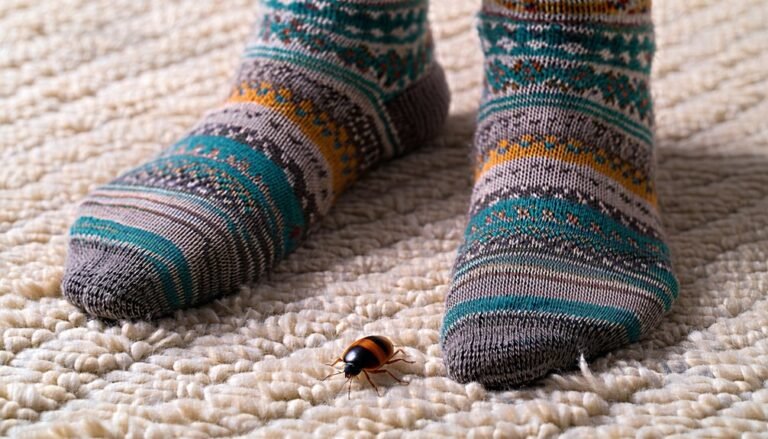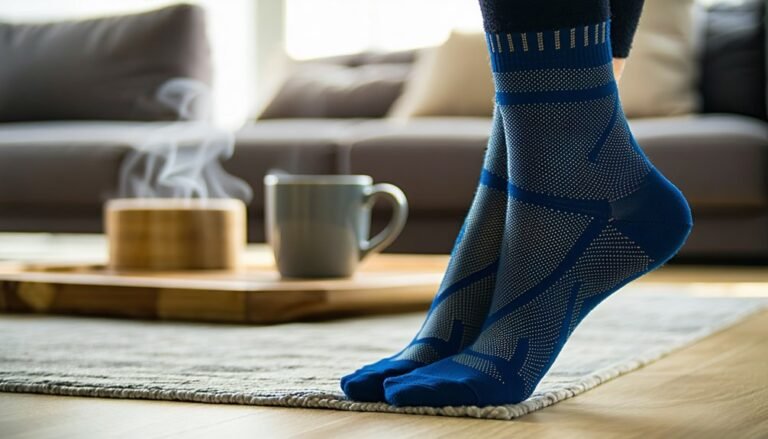Do Socks Keep You Healthy From Cold
Wearing the right socks is essential for keeping you healthy in the cold. They help maintain your body temperature by preventing heat loss, especially from your feet. Warm socks, like those made of wool, provide great insulation and wick moisture away, keeping your feet dry. Cold feet can restrict circulation, impacting your immune system and overall health. If you want to guarantee you're choosing the best socks for winter, there's more to discover about selecting the right ones.
The Science of Thermal Regulation
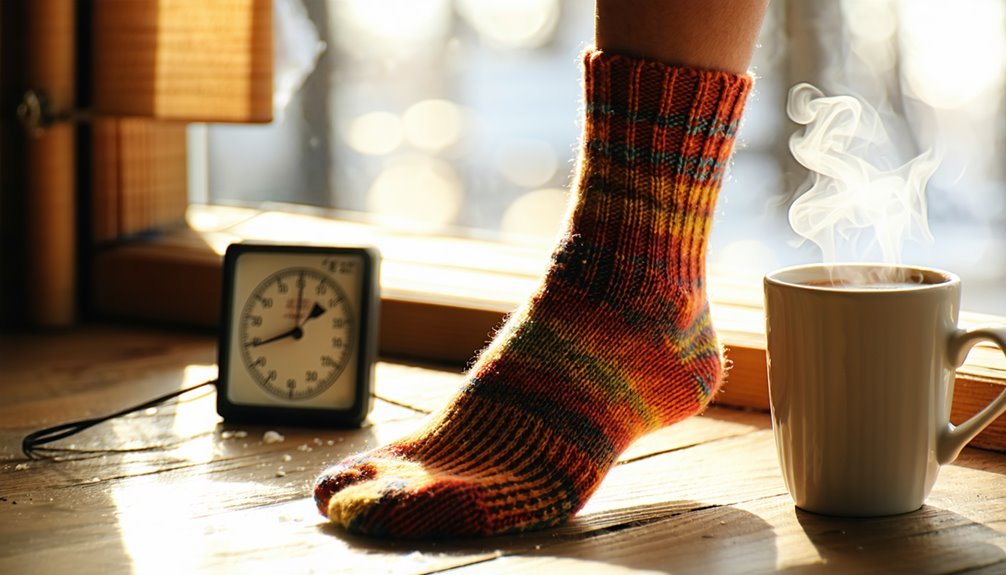
When you think about keeping warm, it's easy to overlook the complex processes your body uses to regulate temperature. Your body maintains a stable core temperature through thermal regulation, which is vital for overall health. When it's cold, your body constricts blood vessels to minimize heat loss, while muscles generate warmth through shivering. This delicate balance is essential to achieve thermal comfort. If your body temperature drops too low, it can lead to hypothermia, a serious condition that can affect organ function. Wearing appropriate clothing, like socks, plays a significant role in maintaining warmth and preventing heat loss from your extremities. By understanding these processes, you can better appreciate the importance of staying warm and safeguarding your body's temperature regulation.
The Role of Foot Warmth in Overall Health
Although you might not realize it, keeping your feet warm can greatly impact your overall health. Proper foot warmth aids in maintaining ideal body temperature, which is essential for your immune system's efficiency. When your feet are cold, blood vessels constrict, reducing foot circulation and potentially leading to numbness or discomfort. This restricted circulation can affect your body's ability to heal and fend off illnesses. Furthermore, maintaining warm feet may help improve your mood and energy levels, as it promotes relaxation and comfort. So, investing in warm socks or slippers isn't just about comfort; it's about supporting your overall health. By prioritizing foot warmth, you're taking a simple yet effective step toward enhancing your well-being.
Types of Socks and Their Insulating Properties
Choosing the right socks can make a significant difference in how well your feet stay warm in cold conditions. Different materials offer various insulating properties. Here's a quick comparison:
| Sock Type | Insulation Quality | Breathability |
|---|---|---|
| Wool | High (retains heat) | Moderate |
| Cotton | Low (loses heat) | High (wicks moisture) |
| Synthetic | Moderate (quick-drying) | Low |
Wool benefits include excellent insulation and moisture-wicking abilities, keeping your feet dry and warm. Cotton breathability is fantastic for warmer days, but it can fail to retain heat in cold weather. When choosing socks, consider these factors to guarantee your feet remain toasty and safe during chilly conditions.
Socks and Immune Function: Is There a Connection?

How much do your socks really impact your immune function? Surprisingly, the answer might be more significant than you think. Wearing socks helps maintain warmth, which can benefit your immunity. When your feet are warm, your body can better focus on fighting off infections rather than expending energy to regulate temperature. Cold feet can constrict blood vessels, potentially limiting circulation and immune response. Additionally, cozy socks can contribute to overall comfort, reducing stress levels, which is vital for a healthy immune system. So, investing in quality socks isn't just about comfort; it's about supporting your socks immunity by harnessing the warmth benefits that keep your body in prime condition to fend off illness.
Practical Tips for Choosing the Right Socks in Winter
When the winter chill sets in, finding the right socks can make all the difference in keeping your feet warm and comfortable. Start by considering sock materials; opt for wool or synthetic blends that wick moisture away while providing insulation. Cotton may feel soft, but it retains moisture, which can lead to cold feet. If you're engaging in winter activities like hiking or skiing, look for thicker, cushioned options that offer extra warmth and support. Additionally, choose socks that fit well—too tight can restrict circulation, while too loose can cause blisters. Finally, don't forget to layer! If it's exceptionally cold, wearing a thin moisture-wicking sock underneath a thicker one can provide added protection against the winter elements.
Frequently Asked Questions
Can Wearing Socks Affect My Mood or Mental Health?
Wearing socks can certainly affect your mood. The warmth and comfort they provide can create a sense of relaxation, reducing stress and enhancing your overall well-being. So, don't underestimate the power of cozy socks!
Are There Specific Materials That Prevent Foot Odor in Socks?
Ever noticed how your friend's cotton socks always smell fresh? That's because materials matter! Wool socks naturally wick moisture away, preventing foot odor better than cotton. Choosing the right socks can keep your feet feeling clean and safe.
How Often Should I Wash My Socks for Hygiene?
To maintain sock hygiene, you should wash your socks after every wear, especially if you've been active. This washing frequency helps prevent odor and bacteria buildup, ensuring your feet stay clean and healthy.
Do Compression Socks Provide Any Additional Benefits in Winter?
You might think compression socks are just for athletes, but they actually enhance winter circulation too. By improving blood flow, they can help reduce swelling and discomfort, offering additional benefits during colder months. Stay cozy and safe!
Can Wearing Socks to Bed Disrupt My Sleep Quality?
Wearing socks to bed might affect your sleep quality, as they can influence sleep temperature. However, they can improve blood circulation, potentially leading to comfort. It's best to find a balance that suits your needs.

